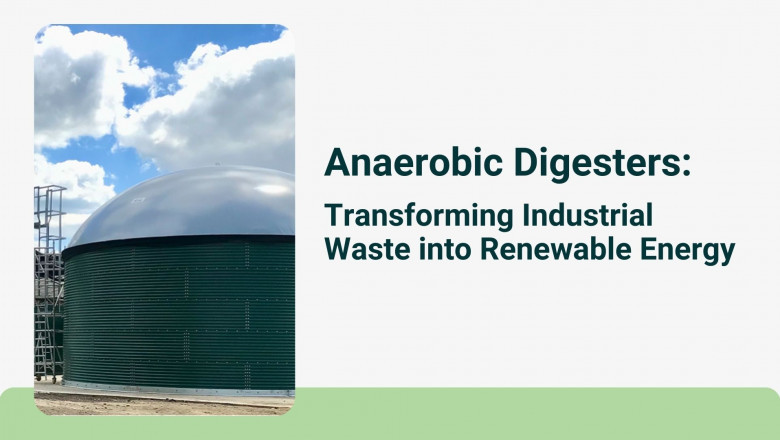views
Anaerobic Digesters: Transforming Industrial Waste into Renewable Energy
Introduction
In today’s rapidly industrializing world, waste management remains a formidable challenge for many sectors. However, innovative solutions like anaerobic digesters are turning this challenge into an opportunity. These systems not only address waste issues but also convert organic matter into renewable energy, contributing to a cleaner and more sustainable future. Elixir Enviro Systems is at the forefront of deploying anaerobic digestion technologies to help industries meet their waste management and energy goals effectively.
Understanding Anaerobic Digestion and Its Benefits
Anaerobic digestion is a natural process where microorganisms break down organic matter, such as industrial waste, in an oxygen-free environment. The byproduct of this process is biogas, a renewable energy source composed primarily of methane and carbon dioxide. Here are some key benefits of using anaerobic digesters in industrial settings:
- Reduction in Waste Volume: Anaerobic digesters reduce the volume of waste that needs to be managed, treated, or disposed of, helping industries lower waste disposal costs.
- Generation of Renewable Energy: The biogas produced can be used as a renewable energy source for heating, electricity generation, or as vehicle fuel, reducing reliance on fossil fuels.
- Environmental Benefits: By capturing methane—a potent greenhouse gas—anaerobic digesters help mitigate climate change. They also reduce pollutants in the environment, enhancing local air and water quality.
How Anaerobic Digesters Work
The anaerobic digestion process involves four stages: hydrolysis, acidogenesis, acetogenesis, and methanogenesis. Here’s a quick look at how these stages transform waste into energy:
Hydrolysis: Breaking Down Large Molecules
In the hydrolysis phase of anaerobic digestion, water and enzymes break down large organic molecules like proteins, fats, and carbohydrates into smaller, soluble ones, such as sugars and amino acids. Bacteria release enzymes to help simplify these complex materials, making them easier for microorganisms to absorb and digest. This breakdown is important because it prepares the molecules for the next steps in the process, allowing bacteria to continue the digestion smoothly.
Acidogenesis: Producing Acids and Gases
In the acidogenesis phase, bacteria convert the smaller molecules from hydrolysis into acids, such as fatty acids, and gases like carbon dioxide and hydrogen. Special acid-producing bacteria consume sugars and amino acids, creating acids, alcohols, and gases in the process. These acids and gases are important because they contribute to the production of methane, the primary component of biogas, in the later stages of anaerobic digestion.
Acetogenesis: Forming Acetic Acid
In the acetogenesis phase, bacteria break down fatty acids into acetic acid, along with carbon dioxide and hydrogen. These bacteria convert fatty acids and alcohols into acetic acid, which is a key component for the next stage of digestion. Acetic acid is particularly important because it serves as a vital source for methane-producing bacteria, which use it to generate biogas, making it essential for the final stage of anaerobic digestion.
Methanogenesis: Creating Methane (Biogas)
In the methanogenesis phase, methanogenic bacteria convert acetic acid and hydrogen into methane (CH₄) and carbon dioxide (CO₂), producing biogas. These bacteria feed on acetic acid and hydrogen to generate methane, which is a valuable energy source. The methane-rich biogas produced can be used for heating, electricity, and other energy needs. Additionally, the process creates a nutrient-rich solid called digestate, which can be used as fertilizer, making this stage essential for both energy production and waste management.
Elixir Enviro Systems’ Role in Anaerobic Digestion Solutions
Elixir Enviro Systems specializes in custom-designed anaerobic digesters tailored to meet specific industrial requirements. Here’s how Elixir helps industries make the most of anaerobic digestion:
- Customized Systems for Diverse Industries: Elixir Enviro Systems understands that each industry has unique waste profiles and operational needs. From food processing to wastewater treatment, Elixir offers tailored solutions that maximize waste-to-energy conversion rates.
- Energy Recovery and Cost Savings: By enabling industries to generate their own renewable energy, Elixir’s anaerobic digesters lower energy costs while also contributing to cleaner production practices.
- Expert Installation and Maintenance: Beyond system design, Elixir provides end-to-end support, from installation and training to regular maintenance. This ensures long-term efficiency and reliability of the anaerobic digestion system.
Future of Anaerobic Digestion in Industrial Sustainability
As industries face increasing pressure to adopt sustainable practices, anaerobic digestion is emerging as a powerful tool for waste management and energy generation. Government regulations, such as tax incentives for renewable energy projects and stricter waste disposal policies, are encouraging more companies to adopt anaerobic digesters. With a growing focus on circular economy principles, this technology will likely become integral to many industrial processes in the coming years.
Conclusion
Anaerobic digesters represent a transformative technology in industrial waste management, turning organic waste into biogas and nutrient-rich byproducts. By leveraging anaerobic digestion, industries not only achieve sustainable waste disposal but also contribute to renewable energy generation, environmental conservation, and economic efficiency. Elixir Enviro Systems remains dedicated to providing tailored anaerobic digestion solutions, helping industries harness the power of waste-to-energy technologies for a greener future.






















Comments
0 comment